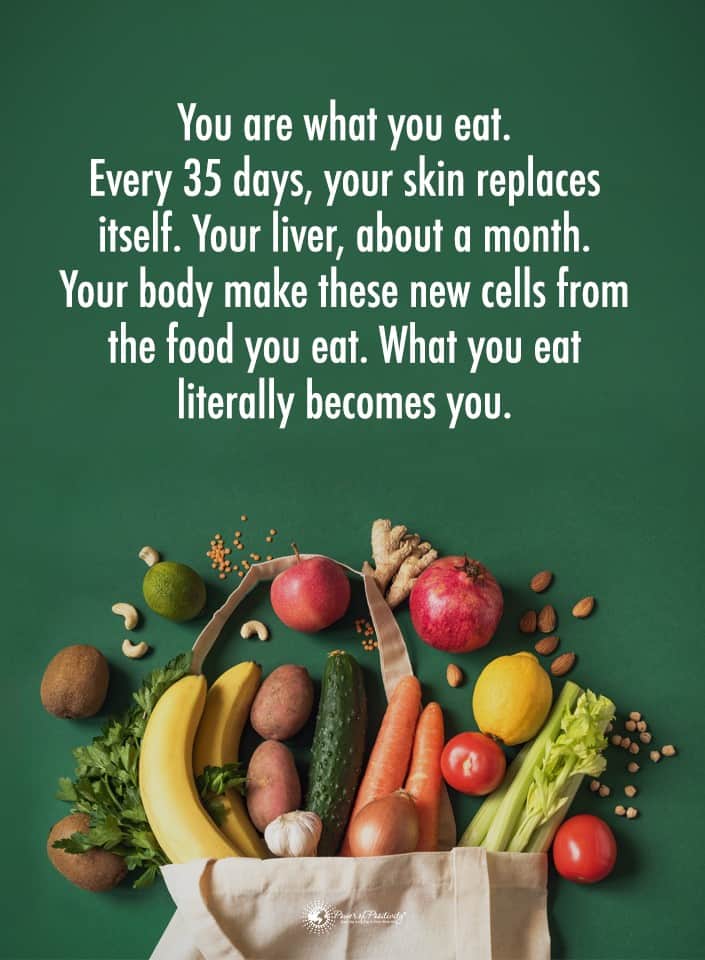Have you ever dieted in the past and ended up gaining back what you lost? Realize that your diet failed, not you. How can you change your eating habits and improve your health?
Fifteen Small Diet Changes To Enhance How You Feel
Do you feel sluggish and have unexplained aches and pains? Maybe your diet is to blame. Here are fifteen ways you can change your diet to feel great and still be satisfied.
1. Only Eat When You’re Hungry
Your body is a unique machine that is hardwired to tell you when it needs food or water. When you run on empty, you’ll feel your stomach growl, and your brain will register that you need food. After a meal, your digestive system will send signals that you are satisfied.
However, many people eat out of habit, boredom, or emotions. It’s easy to rack up empty calories while watching tv and mindlessly grazing. One of the most straightforward diet changes you can make is eating only when you feel hungry and stopping when you’re full.

2. Keep Portion Sizes in Check
If you measured your regular meal portions, you might be surprised at how much you’re eating. According to an article published by Food Insight, amounts in the American diet have increased dramatically since the 1960s. The more food you have on your plate, the more you’re apt to overeat, warns the article.
The best way to regulate your portions is to use standard measuring cups, spoons, and a food scale. You can also trick your brain into thinking you have more food if you use smaller plates and glasses. Read labels carefully and stick to portion size, not just serving size.
3. Replace One Meal With a Big Salad
Perhaps one of your goals for diet changes is to have more plant-based meals. Instead of going vegetarian, you can make slight changes like substituting a meal with a tasty salad.
There’s almost an infinite variety of choices when it comes to healthy salad recipes. Dark leafy greens and multi-colored vegetables provide a wealth of nutrition and fiber. Just be careful of the dressings you use because they can be loaded with fat, sugar, and salt.
4. Don’t Be Afraid To Try New Recipes
Diet changes start in the kitchen, where you control food choices and portions. Are you tired of fast food that’s expensive and affecting your weight? Get creative and try new recipes that have fewer calories and are bursting with flavor.
Many international dishes are naturally healthy. Try researching recipes in magazines or online for inspiration. You’ll be learning about diverse cultures as well as foods and spices you’ve never tried.
5. Drink Water With Lemon
One of the reasons many people avoid drinking water is that they don’t like its blandness. However, your body needs this vital liquid to survive, and you may be dehydrated and not realize it. Plus, drinking water flushes out your system and may help you lose weight.
If you’re one of those who can’t take plain water, try adding some fresh lemon juice. A daily glass of lemon water offers several health benefits, states an article published by the Cleveland Clinic. It can boost your immune system, keep you hydrated, and may even help you lose weight.
6. Add Some Greek Yogurt to Your Day
Yogurt is a delicious way to add calcium and Vitamin D to your diet. If you choose Greek yogurt, you’ll also get an extra dose of protein. Plus, it’s a convenient breakfast or snack on the go that’s good for you.
Remember that all Greek yogurt is not equal. Pick a brand that’s not pre-sweetened or has other fattening ingredients. Read the label to ensure that your Greek yogurt contains live probiotic cultures for better gut health.
7. Skip Buying Fad Diet Foods
When you’re making diet changes, you may be tempted to fill your grocery cart with the latest diet foods. The health and fitness industry is a multi-billion dollar market in America. Unfortunately, these marketers don’t usually have your best interests at heart.
Just glancing at the nutritional labels on some popular fad diet foods can be eye-opening. Many of these foods are highly processed and often contain a lot of artificial ingredients. Some of them can have as many calories as possible or even more than a regular brand, just in smaller portions.
Do yourself a favor and pass on these gimmicky diet foods. Instead, buy nutritious whole foods that are minimally processed.
8. Add Belly-Filling Fiber to Your Diet
You’ve probably heard and read about the benefits of adding fiber to your diet. It’s an essential aid for digestion, nutrient absorption, and feeling full. Do you get enough fiber in your diet?
An article published by the Mayo Clinic recommends that women have at least 21-25 grams of fiber a day and men at least 30-38 grams. You’ll get the most fiber from enjoying whole grains, fruits, and vegetables. A diet rich in fiber can help you feel full faster, so you may eat less.
9. Incorporate Juicing
Remember how your parents always wanted you to eat your vegetables? What if you’re trying to add more veggies and fruit to your diet, but they’re still not your favorite? The good news is that you can get their nutrients by juicing.
Juicers come in a variety of styles, brands, and prices that will fit most budgets. Consider investing in the best quality juicer you can afford. You’ll be amazed at the countless juice recipes you can make that are so delicious that even kids love them.
10. Choose Plant-Based Foods
You needn’t go vegan to enjoy more green foods in your diet changes. Try adding more fruits, vegetables, whole grains, and healthy fats. These groups are full of healthy fiber and less cholesterol.
Maybe you could establish a Meatless Monday at home each week. When you try some of the delicious meatless recipes from around the world, you may never miss it. Plus, you’re kinder to the environment and the animals.
11. Don’t Skimp on the Protein
Protein is the basic building block of nutrition that your body needs to survive and thrive. Almost all your body’s systems require it, so it’s essential to incorporate it into each meal. A lack of protein can make you feel weak and unhealthy.
While lean meats are an excellent source of protein, they’re not the only source. You can also get it from dark leafy greens, legumes, nuts, eggs, and dairy products. To figure your daily protein requirements in grams, multiply your weight by 0.36, per a Harvard Health article.
12. Ditch Sweet Drinks and Sodas
Part of making dietary changes in your life is taking time for research. You may wonder why you’re making the right food choices but still not losing weight. The tell-tale clue may be in the beverages you drink.
Did you know that a can of regular soda can have as many as 170 calories and 46 grams of sugar? If you drink as few as three cans a day, you’re consuming over 500 empty calories and a whopping 138 grams of the white stuff. You certainly don’t need half of a cup of sweetener that will raise your glucose and add to your weight.
Don’t be so quick to exchange soda for power drinks or fruit juice. Both have as much sweetener and calories or even more. Your best bet is to enjoy water or an occasional diet soda.
13. Never Let Yourself Get Too Hungry
Some people erroneously believe that if they go without a meal or two, they can be healthier. While you may lose some weight by going hungry, it’s mostly water, and you’ll gain it back quickly. Plus, your body will go into starvation mode and will retain the fat for as long as possible.
If you wait until you’re hungry to eat, you’re more apt to overeat. It can also drain your wallet if you go grocery shopping on an empty stomach. Avoid eating a heavy meal at night, which is not the best time to eat.
14. Use Mustard Instead of Other Condiments
What would a sandwich, burger, or hotdog be without your favorite condiments? You may pile on these extras without giving thought to their nutritional value. When you look at the labels, you might be shocked.
You’d think that since ketchup is made from tomatoes that it would be healthy. Did you know that a tablespoon of most ketchup has at least 3.7 grams of sugar? Don’t forget the mayo and salad dressings that are high in fat, sweeteners, and salt.
While you can use these condiments in moderation, consider using mustard when you can. It is low in calories and provides a burst of flavor to your food. You can also experiment with fresh herbs and spices for more flavor.
15. Snack on Nuts
Snacking may be one of the most challenging areas for making small diet changes. During the rush of the day, it’s easy to grab a bag of chips or a candy bar from the vending machine. Who knows how many calories most people consume when they are munching on snacks while watching tv or just relaxing?
If you want a snack that’s convenient, healthy, and delicious, you can’t go wrong with nuts. Walnuts, almonds, pecans, and cashews provide a punch of protein, fiber, and heart-healthy amino acids. Just watch your portion size because they aren’t low-calorie foods.

Final Thoughts on Small Diet Changes
It’s easier to make lasting diet changes if you do so gradually. If you consider these tips and other lifestyle changes, you can manage your weight and be healthier. Your whole family could benefit from eating better together.
The post 15 Small Diet Changes That Will Make You Feel Great appeared first on Power of Positivity: Positive Thinking & Attitude.




